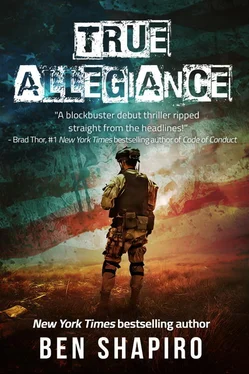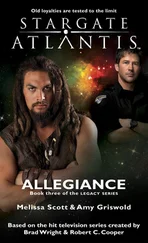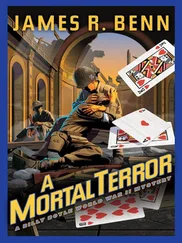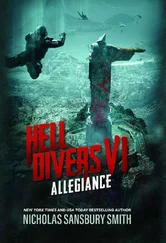Oh, shit , O’Sullivan thought. Then he said, “Hands up. Right now.”
The kid laughed again, a musical tinkling noise. “You ain’t gonna shoot me, pig. What, you afraid of a kid?”
O’Sullivan could feel every breath as it entered his lungs. “No, kid, I don’t want to shoot you,” he said. “But I need you to cooperate. Put your hands above your head. Right now .”
The kid’s hand shifted to his waistband again. O’Sullivan’s hands began to shake.
“Get the fuck out of my neighborhood,” the kid repeated.
O’Sullivan looked around stealthily. Still nobody on the street. Totally empty. The sweat on his forehead felt cold in the night air. In the retraining sessions at the station, they’d told officers to remember the nasty racial legacy of the department, be aware of the community’s justified suspicion of police. Right now, all O’Sullivan was thinking about was getting this kid with the empty eyes to back the fuck off.
“Go on home,” he said.
“ You go home, white boy,” said the kid. His hand moved lower.
Suddenly, O’Sullivan’s head filled with a sudden clarity, his brain with a preternatural energy. He recognized the feel of the adrenaline hitting. He wasn’t going to get shot on the corner of Iowa and Van Dyke outside a shitty convenience store in a shitty town by some eight-year-old, bleed out in the gutter of some city the world left behind. He had a life, too.
The gun felt alive in his hand. The gun was life.
The muzzle was aimed dead at the kid’s chest. No way to miss, with the kid this close, just ten feet away maybe. Still cloaked in the shadow of the gas station overhang.
“Kid, I’m not going to ask you again. I need you to put your hands on top of your head and get on your knees .”
“Fuck you, motherfucker.”
“I’m serious .”
The kid’s hand was nearly inside his waistband now.
“Don’t do that,” O’Sullivan said.
The kid smiled, almost gently.
“Don’t.”
The kid’s smile broadened, the hand moved down into the pants. “Get the fuck out of my hood,” the kid cheerfully repeated. “I’ll cap your ass.”
“Kid, I’m warning you,” O’Sullivan yelled. “Put your hands above your head! Do it now… ”
The roar shattered the night air, a sonic boom in the blackness. The shot blew the kid off his feet completely, knocked him onto his back.
O’Sullivan reached for his radio, mechanically reported it: “Shots fired, officer needs help at the gas station on Iowa and Van Dyke.”
“Ohgodohgodohgodohgod,” O’Sullivan repeated as he moved toward the body, the smoke rising from his Glock. He pointed it down at the kid again, but the boy wasn’t moving. The blood seeped through Homer Simpson’s face, pooled around the kid’s lifeless body. The grin had been replaced with a look of instantaneous shock. His hand had fallen out of his waistband with the force of the shooting.
In it was a toy gun, the tip orange plastic.
For a brief moment, O’Sullivan couldn’t breathe. When he looked up, he saw them coming. Dozens of them. The citizens of Detroit, coming out of the darkness, congregating. He could feel their eyes.
Officer Ricky O’Sullivan sat down on the curb and began to cry.
Ellen

El Paso, Texas
ANOTHER DEAD KID.
He was the fourth in two days, his body so bloated that he was barely recognizable as a boy. His face was caved in, his nose smashed, his eyes blackened and swollen.
Another face no one would see. Or remember. Or care about.
“The coyotes really did a number on him.” Vivian’s voice sounded small behind her. Scared.
“Yes,” Ellen nodded. She stood up straight, took a picture of the body with her cell phone, and then turned from it. “The governor will want the picture. Let’s get it to him.” Just another day. Just another fact-finding mission along the Rio Grande.
Just another dead kid.
Overall, the last year had seen a sudden upsurge in the number of children attempting to cross the border without papers. Not all were children—a surprising number of the unaccompanied minors were of gang age, somewhere between fourteen and seventeen. Some had tattoos. Many were missing fingers, eyes, ears. Law enforcement thought the smugglers had mutilated the kids and sent their body parts back to their parents for ransom.
The flood wasn’t completely unexpected—after President Prescott’s announcement of no deportation for young, unaccompanied minors, parents all across Central and South America began shipping their kids up to the border. Some of the children rode the so-called “Train of Death” from the southern border of Mexico, then waited for American Border Patrol agents to pick them up in the desert. Others paid coyotes to ship their children through Mexico. Many parents never heard from their children again.
But those who did make it swamped the available federal resources. Border Patrol spent their days trying to help doctors screen for disease, trying to dig up enough formula for babies, trying to patch up wounds and find blankets and keep the incipient gang members from knifing each other. That meant that the border had even less personnel.
Every day, Ellen heard complaints from ranchers along the border. They’d been finding bodies on their land. Or ripped panties from rape victims. Or drugs. Or live cartel members acting as lookouts for the coyotes. Some refused to ranch their own land, fearful of stumbling on something that would land them in the soup with the cartels: the murder rate by the cartels along the border scared nearly all of them.
Governor Bubba Davis had asked Prescott for help. Prescott wouldn’t even take his call. He did , however, tell CNN that those who wished to deport these children were obviously driven by xenophobia. That bullshit didn’t surprise Ellen one bit. She knew what Prescott would do to push forward his agenda. Her husband was stuck in Afghanistan and her marriage was a public joke. That was proof positive of that little proposition.
The governor tried using state resources to shore up the border. The legislature passed a law, at his recommendation, enforcing federal immigration law. Noncitizens of the United States found entering the country illegally, the law stated, would be detained by Texas state law enforcement, then handed over to Immigrations and Customs Enforcement for deportation. The governor announced that if the federal government wouldn’t enforce federal law, the state of Texas sure would. After all, the state of Texas was absorbing the cost of the feds’ inaction.
So Prescott’s attorney general, Jim Ballabon, sued Texas. And won. If the federal government didn’t want to enforce the law, the Supreme Court found, it didn’t have to do so. And if the state of Texas attempted to enforce that law, the court continued, it would be usurping federal authority. “Damned if you do, damned if you don’t,” the governor had muttered angrily to Ellen.
Ellen looked once more at the body of the dead child, then turned and walked away. It wasn’t until she reached the black Ford F-150 that Ellen bent over and threw up. Then she primly took out a handkerchief and wiped away the vomit from her mouth.
“You ready to go, Viv?” she said.
Ellen first noticed the helicopter following her truck a few minutes after leaving the Rio Grande. It wasn’t a news helicopter, Ellen knew—it was too decrepit for that, obviously a 1980s model. Cheap. Black. She could see it through her rearview mirror in the distance. And it was gaining.
Читать дальше













